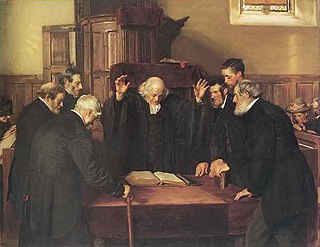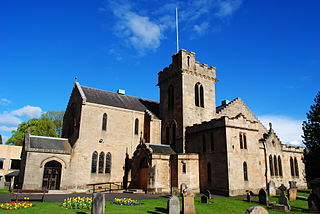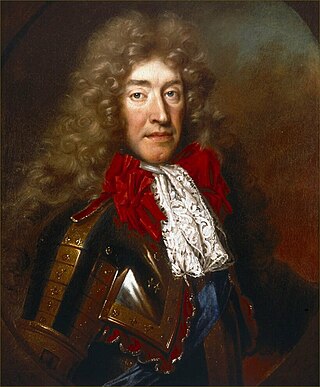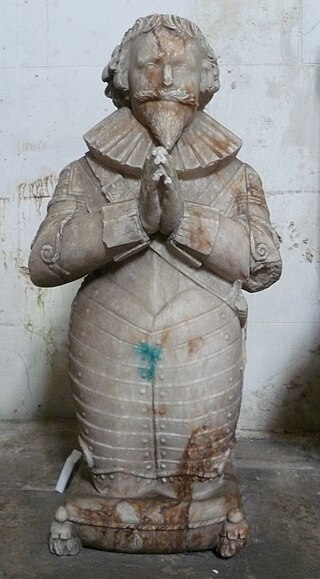Presbyterianpolity is a method of church governance typified by the rule of assemblies of presbyters, or elders. Each local church is governed by a body of elected elders usually called the session, though other terms, such as church board, may apply. Groups of local churches are governed by a higher assembly of elders known as the presbytery or classis; presbyteries can be grouped into a synod, and presbyteries and synods nationwide often join together in a general assembly. Responsibility for conduct of church services is reserved to an ordained minister or pastor known as a teaching elder, or a minister of the word and sacrament.

John Spottiswoode was an Archbishop of St Andrews, Primate of All Scotland, Lord Chancellor, and historian of Scotland.
The Book of Discipline refers to two works regulative of ecclesiastical order in the Church of Scotland, known as The First Book of Discipline (1560) and The Second Book of Discipline (1578), drawn up and printed in the Scottish Reformation. The first was drafted by a committee of "six Johns", including leading reformer John Knox. It set out a system of Presbyterian polity on the Geneva model, but the lack of funds meant its programme of clerical organisation and education was largely abandoned. The second book was adopted after the forced abdication of Mary Queen of Scots and was much more clearly Presbyterian in outlook. It placed church supervision fully in the hands of groups of elected church leaders in presbyteries.

A Church of Scotland congregation is led by its minister and elders. Both of these terms are also used in other Christian denominations: see Minister (Christianity) and Elder (Christianity). This article discusses the specific understanding of their roles and functions in the Scottish Church.

New Kilpatrick, is an ecclesiastical Parish and former Civil Parish in Dunbartonshire. It was formed in 1649 from the eastern half of the parish of Kilpatrick, the western half forming Old Kilpatrick. New Kilpatrick is also a disused name for the town of Bearsden.

The Church Patronage (Scotland) Act 1711 or Patronage Act is an act of the Parliament of Great Britain. The long title of the act is An Act to restore the Patrons to their ancient Rights of presenting Ministers to the Churches vacant in that Part of Great Britain called Scotland. Its purpose was to allow the noble and other Patrons in Scotland to gain control over the Church of Scotland parish churches again, having lost that custom in the Glorious Revolution.

The Education Act 1696 was an act of the Parliament of Scotland that ordered locally funded, church-supervised schools to be established in every parish in Scotland. It was passed by the Parliament at Edinburgh on 8 September 1696 in the reign of Mary II and William II. The Act for Settling of Schools stated that for every parish without a school and paid schoolmaster
William M'Culloch was Minister of Cambuslang during the extraordinary events of the Cambuslang Work (1742) when 30,000 people gathered in the hillsides near his church for preaching and communion. Many were there struck by their own depravity and horrified at the probable punishment after death. Trembling, wailing, great pain, nose-bleeding and other strange behaviour was followed in some cases by striking conversions when they suddenly felt accepted by Christ. This gave rise to great rejoicing and singing. It was later calculated that about 400 people had been converted, though many had backslided. The Reverend M’Culloch was a strange person to be at the centre of this phenomenon — one that was being repeated in the American Colonies at the time. He was a poor preacher and claimed never to have experienced the strong feelings of sin or conversion that so many others had reported.
The history of the Scottish Episcopal Church is traced by the church to ancient times. The Church today is a Christian denomination in Scotland and a member of the Anglican Communion. It has enjoyed a distinct identity and is neither Roman nor English. It is therefore not a Daughter Church in the Anglican communion.

The Education Act 1633 was an act of the Parliament of Scotland that ordered a locally funded, Church-supervised school to be established in every parish in Scotland, and included the means to realise that order. The act was passed by the Parliament at Edinburgh on 18 June 1633, titled "Ratification of the act of council regarding plantation of schools". It stated:
The School Establishment Act 1616 was an Act of the Scottish Privy Council dated 10 December 1616. It mandated the establishment of publicly funded, Church-supervised schools in every parish of Scotland. The act was a consequence of the Scottish Reformation, and was the basis of all future acts of the Parliament of Scotland related to school establishment.

The history of education in Scotland in its modern sense of organised and institutional learning, began in the Middle Ages, when Church choir schools and grammar schools began educating boys. By the end of the 15th century schools were also being organised for girls and universities were founded at St Andrews, Glasgow and Aberdeen. Education was encouraged by the Education Act 1496, which made it compulsory for the sons of barons and freeholders of substance to attend the grammar schools, which in turn helped increase literacy among the upper classes.

Under Charles I, the Puritans became a political force as well as a religious tendency in the country. Opponents of the royal prerogative became allies of Puritan reformers, who saw the Church of England moving in a direction opposite to what they wanted, and objected to increased Catholic influence both at Court and within the Church.

The Restoration was the return of the monarchy to Scotland in 1660 after the period of the Commonwealth, and the subsequent three decades of Scottish history until the Revolution and Convention of Estates of 1689. It was part of a wider Restoration in the British Isles that included the return of the Stuart dynasty to the thrones of England and Ireland in the person of Charles II.
Archibald Davidson was a Scottish minister who was moderator of the General Assembly of the Church of Scotland in 1788 and was principal of Glasgow University.

The Glorious Revolution in Scotland refers to the Scottish element of the 1688 Glorious Revolution, in which James VII was replaced by his daughter Mary II and her husband William III as joint monarchs of Scotland, England and Ireland. Prior to 1707, Scotland and England shared a common monarch but were separate legal entities, so decisions in one did not bind the other. In both countries, the Revolution confirmed the primacy of Parliament over the Crown, while the Church of Scotland was re-established as a Presbyterian rather than Episcopalian polity.

Education in early modern Scotland includes all forms of education within the modern borders of Scotland, between the end of the Middle Ages in the late fifteenth century and the beginnings of the Enlightenment in the mid-eighteenth century. By the sixteenth century such formal educational institutions as grammar schools, petty schools and sewing schools for girls were established in Scotland, while children of the nobility often studied under private tutors. Scotland had three universities, but the curriculum was limited and Scottish scholars had to go abroad to gain second degrees. These contacts were one of the most important ways in which the new ideas of Humanism were brought into Scottish intellectual life. Humanist concern with education and Latin culminated in the Education Act 1496.

Scottish religion in the seventeenth century includes all forms of religious organisation and belief in the Kingdom of Scotland in the seventeenth century. The 16th century Reformation created a Church of Scotland, popularly known as the kirk, predominantly Calvinist in doctrine and Presbyterian in structure, to which James VI added a layer of bishops in 1584.
James Crombie D.D. (1730–1790) was the founder of Belfast Academy.

The history of schools in Scotland includes the development of all schools as institutions and buildings in Scotland, from the early Middle Ages to the present day. From the early Middle Ages there were bardic schools, that trained individuals in the poetic and musical arts. Monasteries served as major repositories of knowledge and education, often running schools. In the High Middle Ages, new sources of education arose including choir and grammar schools designed to train priests. Benedictine and Augustinian foundations probably had charitable almonry schools to educate young boys, who might enter the priesthood. Some abbeys opened their doors to teach the sons of gentlemen. By the end of the Middle Ages, grammar schools could be found in all the main burghs and some small towns. In rural areas there were petty or reading schools that provided an elementary education. Private tuition in the families of lords and wealthy burghers sometimes developed into "household schools". Girls of noble families were taught in nunneries and by the end of the fifteenth century Edinburgh also had schools for girls, sometimes described as "sewing schools". There is documentary evidence for about 100 schools of these different kinds before the Reformation. The growing humanist-inspired emphasis on education cumulated with the passing of the Education Act 1496.












